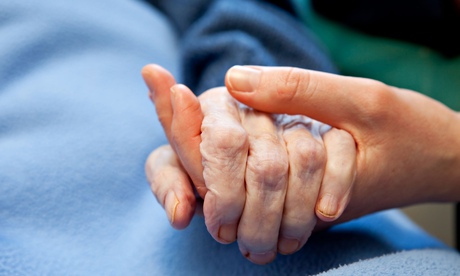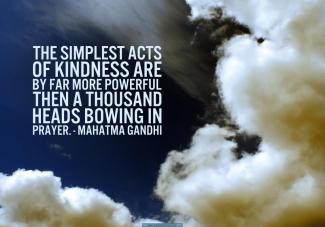'The reason we are losing our values is that we are failing to nourish them and hold on to them.
It is a collective meanness of spirit.'

Photo: The Guardian
‘The Dalai Lama was once asked what surprised him most. He replied: "Man, because he sacrifices his health in order to make money. Then he sacrifices money to recuperate his health. And then he is so anxious about the future that he does not enjoy the present; the result being that he does not live in the present or the future. He lives as if he is never going to die, and then dies having never really lived."
Now let me share with you the words and sentiments of a young executive, a CEO, earning a lot of money, with bonuses, power, and more: “Now it's all about Productivity, Pay, Performance and Profit - the four Ps – which are fuelled by the three Fs: Fear, Frustration and Failure. Just sometimes I wish that in the midst of these Ps (& Fs), there was some time left for another set of four Fs: Families, Friends, Festivals and Fun.”
You see ladies and gentlemen, we need values, we need love, friendship, kindness, generosity, sympathy, empathy, and compassion to be the guiding principles of all we do. Otherwise, no amount of money, capital, technology, IT, theories and policies, can save us from our own mistakes, the crises of our own making.’ Kamran Mofid, “A Better Path”, School of Economic Science, Saturday 8 February 2014

“We bewail the loss of our values, whether we call them civilised, British, western or Christian. We turn to a minority of migrants and blame them for ostensibly diluting them. But it is simply not true. The reason we are losing our values is that we are failing to nourish them, cherish them and hold on to them. It is a collective meanness of spirit.
The reason we are becoming less and less like the Britain we recognise is not the presence of Polish plumbers; it is the putting up of spikes to shoo away the homeless instead of them offering a cup of tea. The reason this is no longer a civilised country is not the presence of a smattering of mosques; it is the decision to let people drown in the sea to save a measly amount which will not make even the smallest dent in our budget. The reason we are turning uncivilised, un-British, unchristian, un-western – however you define it – is the lack of tangible kindness. We are simply turning into the worst version of ourselves.
Fight back. Be the best version of yourself. Be kind to someone.”
‘I was having a Skype chat with my mother on Sunday. She was smiling from ear to ear, pleased that I was clean-shaven for the role I am currently playing. “I can see your lovely face,” she kept saying. She was also trying to share a bowl of peanuts with me by bumping it into the laptop’s monitor every few minutes. She has stage-two Alzheimer’s, you see. In that futile gesture, however, laid a thought. Love is a physical act. Kindness is tangible.
It seems to me that this is a concept that largely eludes many of us nowadays. We talk about the prudence of military action, of participating in the bombing of this faraway place or that. We use terms such as “surgical strike” and “collateral damage”. Anyone who is unsure about the wisdom of war is met with the response “fine then, let’s do nothing and let innocent people die”. But inaction is not the opposite of bombing, and indifference not the only alternative to war. Pointing to actively working to bring about peace as the alternative, in such a conversation, one is frequently met with a look or a comment that implies they live in some dreamworld where concepts like this exist.
Yet it is not so. To the thousands of people who volunteer at home and abroad, to the people marching to preserve a free and universal national health service, to the millions who care for their elderly relatives, to parents staying up with a child who has a fever, to my confused mother trying to feed her son through a Wi-Fi connection, love is a physical act and kindness tangible.
On Monday, I visited a new coffee house opened by an acquaintance in London. The Gentlemen Baristas, they call themselves. I was there with a friend who lost his father to cancer a few months ago. His mother’s diagnosis is terminal. He has just done the Tough Mudder challenge to raise money for Macmillan Cancer Support. The same thought buzzed around my brain. “There he is,” I thought, “doing something physical which translates directly into love.”
When we paid for our coffee, one of the people who runs the coffee shop, Ed Parkes, came over and gave him a tiny brown envelope. We inquired as to its contents. We were told it is a “good egg card”. They give them to people who made them smile or they saw help someone or were kind in some way, to pass on to someone else observed doing the same. That person can then present it for a free coffee. The gesture touched me. Here was this small start-up business, physicalising kindness. Kindness is tangible.
And so is unkindness and meanness of spirit. Placing spikes outside a building, to prevent someone destitute from taking shelter for the night is a physical, tangible act of unkindness. On Monday the Foreign Office announced that Britain will not support any future search and rescue operations to prevent people illegally trying to cross the Mediterranean from drowning. It is meanness of spirit translated into policy.
There are lines which, if crossed, make us immoral as a country. This is one of them, especially considering our involvement in the conflicts in the Middle East and North Africa which fuel the surge in refugees. It leaves our allies with a choice to either make up the shortfall or let people drown in their waters. People – men, women and children – not migrants or refugees; not numbers. Families like mine and yours, fleeing in precisely the same way we would if we lived in a war zone.
We bewail the loss of our values, whether we call them civilised, British, western or Christian. We turn to a minority of migrants and blame them for ostensibly diluting them. But it is simply not true. The reason we are losing our values is that we are failing to nourish them, cherish them and hold on to them. It is a collective meanness of spirit.
The reason we are becoming less and less like the Britain we recognise is not the presence of Polish plumbers; it is the putting up of spikes to shoo away the homeless instead of them offering a cup of tea. The reason this is no longer a civilised country is not the presence of a smattering of mosques; it is the decision to let people drown in the sea to save a measly amount which will not make even the smallest dent in our budget. The reason we are turning uncivilised, un-British, unchristian, un-western – however you define it – is the lack of tangible kindness. We are simply turning into the worst version of ourselves.
Fight back. Be the best version of yourself. Be kind to someone today. Be a good egg. You will almost certainly feel lifted by it. You may even get a coffee out of it.’
*The above article was first published in the Guardian on 28 October 2014
Read more:
“A Better Path”: A Lecture at School of Economic Science
Why Love, Trust, Respect and Gratitude Trumps Economics
